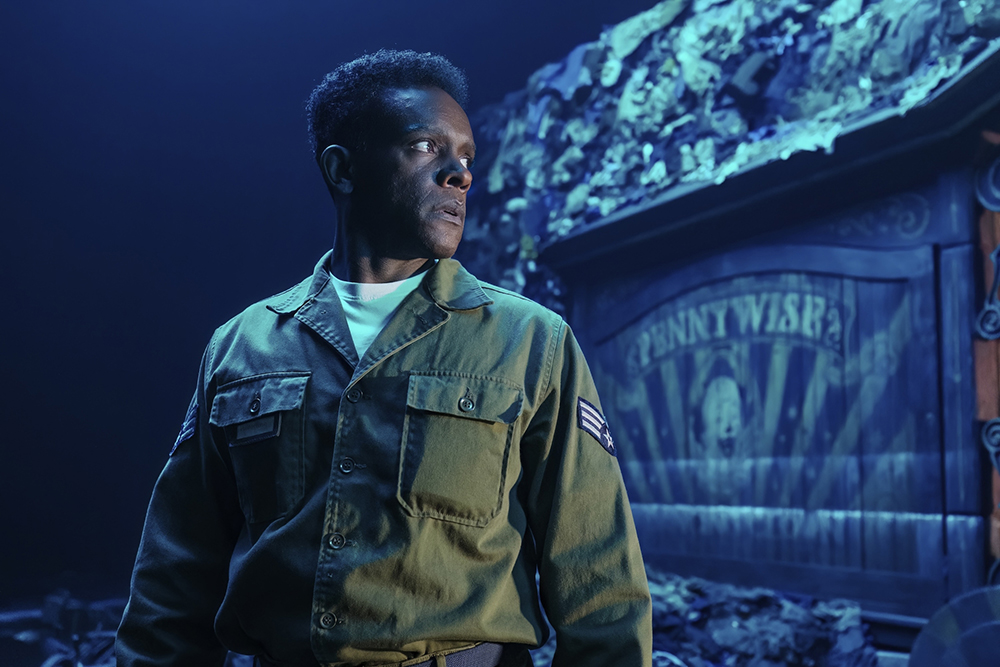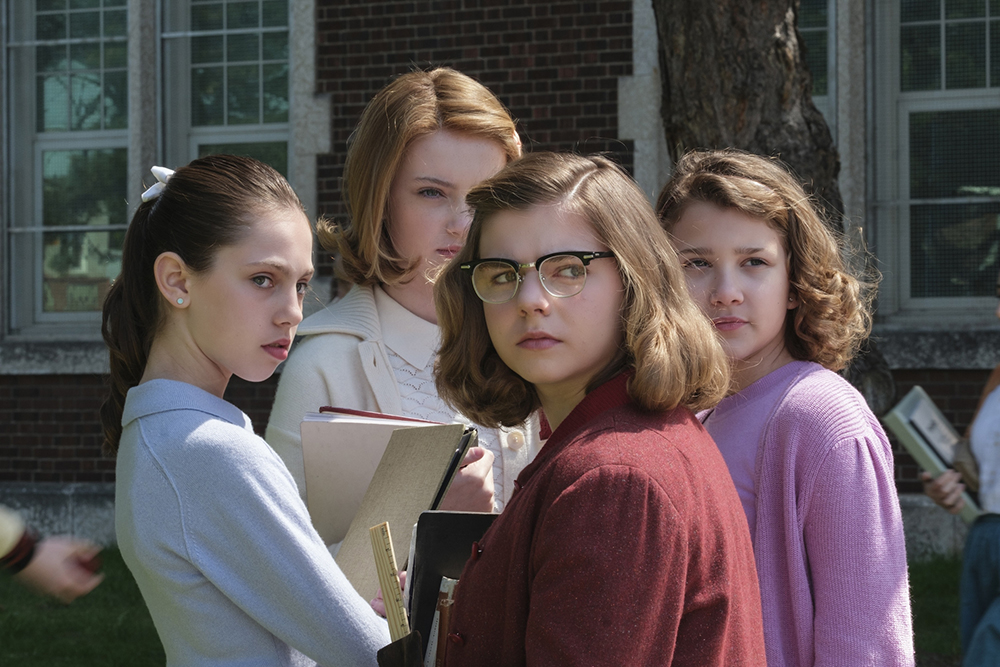HBO max - IT: Welcome to Derry – A Return to Stephen King’s Darkest Town, One Whisper at a Time
By Mulder, 24 october 2025

From the outset, IT: Welcome to Derry establishes a grammar of fear that does not seek easy effects, but rather gradual contamination: winter light, tight frames, silences that buzz like evil thoughts. Set in 1962, the first episode establishes a precise social and psychological backdrop—Cold War paranoia, hostile politeness, polished Anglo-Saxon culture—and uses it as a sounding board rather than mere vintage wallpaper. There is a clear desire to extend Stephen King's imagination without simply copying it, focusing on what television does best: duration, detail, and meaningful backgrounds. The staging adopts a tempo of strangeness: the camera glides, listens, lingers on innocuous gestures until they become suspicious, then pulls back at the exact moment when we think we can grasp everything. This refusal to explain too soon, coupled with surgical sound design—air noises, micro-creaks, vintage machines sighing—gives the episode a sensory depth rare for a pilot.
What is striking is the confidence of the art direction: signs, textures, costumes, everything breathes the era without embalming it. The producing duo of Andy Muschietti and Barbara Muschietti, with Jason Fuchs and Brad Caleb Kane at the helm, seem to have understood that fear intensifies when the environment appears livable. Derry is not a macabre amusement park: it is a small town that tries to appear normal, and it is precisely this veneer that unsettles the viewer. In this first chapter, the series strives to bring the locations—cinema, streets, military base—to life as characters, with their dark areas and blind spots. The wide shot tells the story of a world, the close-up tells the story of unease; in between, the editing allows room to breathe, which allows the surprises to truly surprise without ever becoming flashy.

In terms of acting, this first episode wisely relies on presence rather than effects. Jovan Adepo imposes an immediate intensity, a mixture of authority and mistrust that magnetizes the frame, while Taylour Paige plays lucidity with gentleness, attentive to microaggressions and the perverse logic of “everything is fine.” Chris Chalk, in a youthful counter-casting for Dick Hallorann, walks a delicate line between vulnerability and intuition—a role that shows promise if it continues to be handled with care. Opposite them, the young performers exist without the pilot attempting to “remake” The Losers' Club: Amanda Christine, Clara Stack, Jack Molloy Legault, and Mikkal Karim Fidler quickly find a common tune, though not yet a mythology. Even with his measured presence, Bill Skarsgård retains that tone, that physicality of a playful predator that is enough to charge the air; The series makes the right choice: suggest first, name later.
Formally, the first episode favors low-tech tension devices: tricky depth of field, framing that lets the background come alive, diegetic sounds that stretch on a little too long. At times, it brings to mind Stephen King's beloved rumor mechanics: fear doesn't come through a tunnel, it seeps through the walls. The photography adopts a cold, almost powdery palette that avoids retro postcard imagery; contrasts are used not to create beauty but to guide the eye—a door that isn't quite closed, a reflection that doesn't obey. Even the music keeps its distance, preferring to emphasize the pauses rather than the reveals. The result: the pilot doesn't try to “win” the first round by knockout, it scores points by accumulation, in an almost documentary style, and it is precisely this stubborn realism that sets the stage for derailments.

This first episode also has the merit of raising themes without deploying explanatory panels: the invisibility of children, the ease of scapegoating, the politicization of territory under the guise of modernity. The series captures the unspoken phrase that runs through the city—“here, we don't make a fuss”—and turns it against its characters, like a weapon of social deterrence. The supporting cast contributes to this: James Remar exudes institutional authority with persuasive dryness, Stephen Rider embodies a dignity that speaks louder than words, and Blake Cameron James and Arian S. Cartaya sketch out a camaraderie tinged with the fear of misreading the signs. At no point does the pilot emphasize its shared world; it prefers to show a community that censors itself, and it is this discipline of denial that already creates the fantastical.
Finally, the most reassuring aspect for the future lies in the handling of mythology. The first episode accepts that it is only an opening: it defines a method (watch, doubt, listen) before defining rules. A few discreet nods to Stephen King's vast territory appear, like secondary roads that we note on the map without venturing down them. It's a more ambitious promise than it seems: if the series continues to explore Derry's moral off-screen as much as its supernatural shadows, it will be able to claim to be more than just an appendix. This pilot leaves behind a rare feeling: that of a danger advancing slowly, a story that trusts in what is left unsaid, and a team—Andy Muschietti, Barbara Muschietti, Jason Fuchs, Brad Caleb Kane—that knows that the real spoiler is not an event, but an explanation given too soon. Here, we are spared both, and that is precisely why we want to discover the other episodes.

Synopsis :
Strange events unfold in the town of Derry in the 1960s involving Pennywise the clown, a mysterious character who haunts Derry.
It: Welcome to Derry
Directed by Andy Muschietti
Showrunners : Jason Fuchs, Brad Caleb Kane
Executive producers : Jason Fuchs, Brad Caleb Kane, Andy Muschietti, Barbara Muschietti, Shelley Meals, Roy Lee, Dan Lin, Bill Skarsgård
Producers : Lyn Lucibellon Sarah Rath
Written by Jason Fuchs, Austin Guzman, Guadalis Del Carmen, Gabe Hobson, Helen Shang, Brad Caleb Kane, Cord Jefferson, Brad Caleb Kane
Based on Characters by Stephen King
Developed by Andy Muschietti, Barbara Muschietti, Jason Fuchs
Starring Taylour Paige, Jovan Adepo, Blake Cameron James, Chris Chalk, James Remar, Stephen Rider, Madeleine Stowe, Rudy Mancuso, Clara Stack, Amanda Christine, Mikkal Karim-Fidler, Bill Skarsgård
Cinematography : Rasmus Heise
Edited by Esther Sokolow, Glenn Garland, Matthew V. Colonna
edited by (as Matthew V. Ace Colonna) / (as Matthew Colonn
Music by Benjamin Wallfisch
Production companies : HBO, Warner Bros. Television, Double Dream, FiveTen Productions
Release dates : October 2, 2025 (United States),
Running time : 8 episodes

